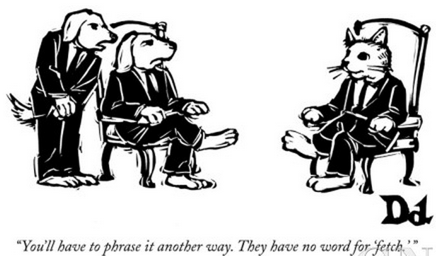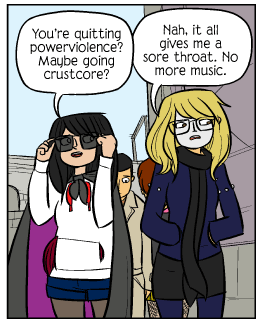No word for fetch
By Drew Dernavich, originally published August 20, 2007, a cartoon addition to our No Word for X archive:

Or, to put it another way: "They have no words for anything, but they have no concept for 'fetch'."
[h/t Joan M.]
By Drew Dernavich, originally published August 20, 2007, a cartoon addition to our No Word for X archive:

Or, to put it another way: "They have no words for anything, but they have no concept for 'fetch'."
[h/t Joan M.]
A visitor from another galaxy, or perhaps just from another century, would notice that civilized people these days are obsessed with the rate of vocabulary display as a symbol of social status. The latest symptom of this obsession is Matt Daniels, "The Largest Vocabulary in Hip Hop", May 2014:
Literary elites love to rep Shakespeare’s vocabulary: across his entire corpus, he uses 28,829 words, suggesting he knew over 100,000 words and arguably had the largest vocabulary, ever.
I decided to compare this data point against the most famous artists in hip hop. I used each artist’s first 35,000 lyrics. That way, prolific artists, such as Jay-Z, could be compared to newer artists, such as Drake.
Read the rest of this entry »
Don Seiffert, "Is it a drug, or is it a Pokemon?", bioflash 11/18/2014:
It was while trying to straighten up my 10-year-old son's room that I hit upon the answer to the age-old question of where do they come up with the names of new drugs.
The answer: It's got to be the same people who come up with the names of new Pokemon characters.
Read the rest of this entry »
On Friday, I gave a talk at the 46th Algonquian Conference. As the conference web page explains,
The 46th Algonquian Conference will be held in Uncasville, Connecticut, on the reservation of the Mohegan Tribal Nation. This is the first time in 46 years that the conference will be held on sovereign Native territory.
The 46th Algonquian Conference coincides with the 20th Anniversary of the Mohegan Tribe winning its sovereignty through federal recognition. The conference itself will be held in the Mohegan Sun Hotel and Convention Center at the Mohegan Sun Casino.
In our registration packet was a copy of Melissa Jayne Fawcett, The Lasting of the Mohegans, 1995.
Read the rest of this entry »
Maddie York, "Why there are too many women doctors, women MPs, and women bosses", The Guardian 10/17/2014:
I am a subeditor at the Guardian. I am a woman. I am not a woman subeditor. But “woman” and its plural seem to be taking over the role of modifier, so that now, there is no such thing, as far as much of the media is concerned, as a female doctor, a female MP or a female chef. Instead you hear or read about a woman doctor, a woman MP and so on. […]
As far as the Guardian style guide is concerned, it is simply wrong to use “woman” and “women” in this way, because, it says, they are not adjectives.
Read the rest of this entry »
Lawrence Block's 1992 novel A Walk Among the Tombstones has been made into a recently-released movie. I haven't seen the movie, but in the book, the character TJ carries out what sociolinguists would call a "matched guise experiment". This is a technique for measuring language attitudes by having the same speaker read a passage in two different ways, and asking hearers a series of questions about the speaker's intelligence, honesty, or whatever.
Read the rest of this entry »
A few years ago, people noticed that the predictive typing on Android smartphones could construct interesting phrases all on its own: "Your typical sentence", 6/13/2012. iOS 8 has caught up — Geoffrey Fowler and Joanna Stern, "iOS 8 Keyboard Makes Hilarious 'Mad Libs' For You", WSJ 9/17/2014:
Now the latest version of Apple’s iPhone software, iOS 8, adds a layer of smarts on top of autocorrect called QuickType, predictive typing of a sort previously found on Android. Not only does it suggest spelling, it also suggests words you might want to type next. If you keep following its train of robotic thought, QuickType will form entire sentences on your behalf.
The result is so goofy that it is brilliant. For the last week, we—your WSJ personal technology columnists—have been conducting serious tests of the new iPhones and iOS 8, while also holding nonsensical auto-generated conversations with each other.
Read the rest of this entry »
From Ikea and ad agency BBH:
And feel the force of Contrastive Focus Reduplication™.
Read the rest of this entry »
Yesterday I was skimming the digital New York Times and clicked on the second-from-the-right item in the panel below, without noticing the "paid post" superscript:
This took me to an article about a new smartphone app called Somebody:
Here’s how Somebody works: when you send your friend or loved one a message through the app, it doesn’t go directly to them, but uses GPS to locate the Somebody user nearest to him or her. This person (probably a stranger) delivers the message verbally, acting as your stand-in.
Read the rest of this entry »
Geeta Pandey, "An 'English goddess' for India's down-trodden", BBC News 2/15/2011:
The Dalit (formerly untouchable) community is building a temple in Banka village in the northern Indian state of Uttar Pradesh to worship the Goddess of the English language, which they believe will help them climb up the social and economic ladder.
About two feet tall, the bronze statue of the goddess is modelled after the Statue of Liberty.
"She is the symbol of Dalit renaissance," says Chandra Bhan Prasad, a Dalit writer who came up with the idea of the Goddess of English.
"She holds a pen in her right hand which shows she is literate. She is dressed well and sports a huge hat – it's a symbol of defiance that she is rejecting the old traditional dress code.
"In her left hand, she holds a book which is the constitution of India which gave Dalits equal rights. She stands on top of a computer which means we will use English to rise up the ladder and become free for ever."
Read the rest of this entry »
 In today's Bad Machinery, Shauna abandons powerviolence and decides against crustcore.
In today's Bad Machinery, Shauna abandons powerviolence and decides against crustcore.
Some of you will recognize that these are names of musical genres, well enough established to have Wikipedia entries. Thus
Powerviolence […], is a raw and dissonant subgenre of hardcore punk.The style is closely related to thrashcore and grindcore.
and
Crust punk (often simply crust) is a form of music influenced by anarcho-punk, hardcore punk and extreme metal.
Read the rest of this entry »
When I was studying Buddhism at the University of Washington (Seattle) in 1967-68, there were about ten students in my first-year Sanskrit course for Buddhologists and Indologists. What intrigued me greatly was that there was another beginning Sanskrit course being offered at the same time. It had many more students than the class I was in and was offered by the Linguistics Department. The rationale for encouraging (I can't remember if it was actually required) linguistics students to take Sanskrit was that the foundations of the scientific study of language had been laid by Panini, Patanjali, and other ancient Sanskrit grammarians around two and a half millennia ago, so that it would be good to have at least a basic understanding of the roots of the tradition.
Read the rest of this entry »
Via HiLobrow (8/10/2014), Ben Zimmer came across this virtuoso display of Gothic katakana on feitclub's Tumblr:
Read the rest of this entry »